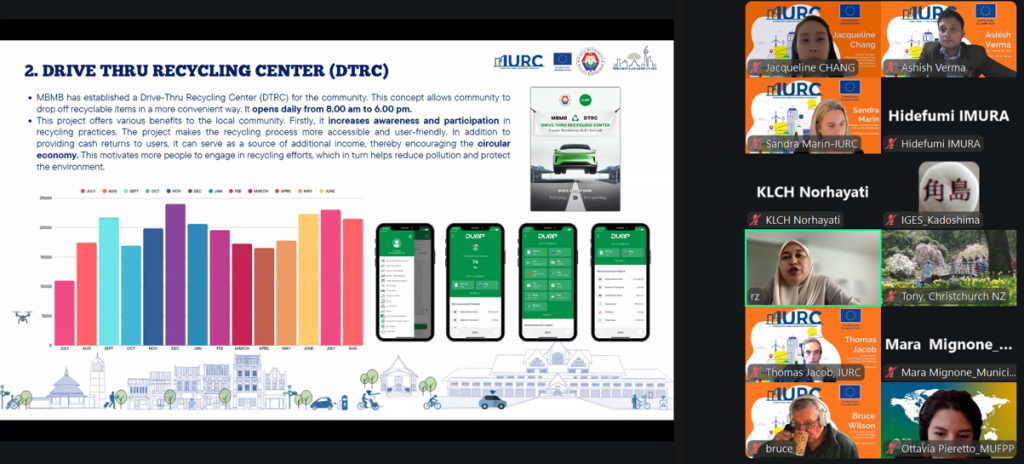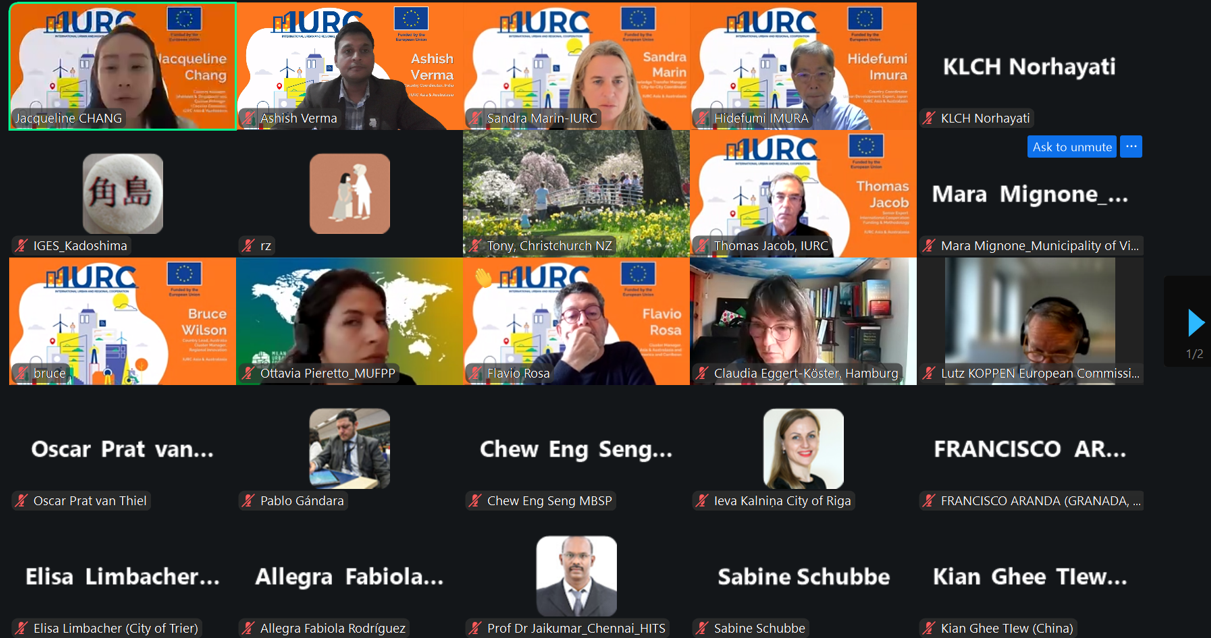6 October 2025 – Online session
The International Urban and Regional Cooperation (IURC) Asia & Australasia (AA) Thematic Networkcontinued its Circular Economy cluster webinar series with the second Deep Dive Session on Circular Economy and Waste Management, bringing together 54 participants from Europe and Asia.
The session highlighted innovative urban approaches from Hamburg (Germany), Kuala Lumpur (Malaysia), Vicenza (Italy), and Melaka (Malaysia), showcasing the breadth of circular economy practices and the shared commitment to sustainability, inclusivity, and innovation.
Opening and Context: Circularity as a Shared Mission
The session was moderated by Ms. Jacqueline Chang, IURC Cluster Manager, who introduced other supporting members or the IURC team, including Mr. Ashish Verma (India Country Coordinator), Ms. Saeko Kadoshima(Japan Helpdesk), Ms. Ryoko Nakano (Cluster & Pairing Manager, Japan), and Professor Hidefumi Imura (Senior Expert & Japan Country Coordinator).
Ms. Chang underscored that the goal of the deep dive was to explore how cities apply circular economy principles to local waste challenges—linking circularity, inclusivity, and low-carbon urban development. She introduced the four guiding quadrants for inclusive circular cities: environment, society, economy, and space, encouraging cities to exchange strategies and form partnerships. She also launched the IURC Circular Economy Community Group channel for continuous peer learning and reminded participants of compliance with EU GDPR and data protection standards. “These sessions allow cities to inspire each other through practical, scalable solutions that achieve both environmental and economic value,” she said.

Hamburg: Circular Strategy and Transnational Collaboration
Ms. Claudia Eggert-Köster, Advisor for Circular Economy, Ministry for Environment, Climate, Energy and Agriculture, Hamburg, presented the city’s comprehensive Circular Economy Strategy, anchored in a coalition paper (April 2025) guiding policies through 2028–2029. She detailed Hamburg’s sectoral focus on construction, textiles, food, plastics, and packaging, supported by strong stakeholder engagement through the Eco-Partnership (UmweltPartnerschaft) and expert circles for circular economy, sustainable finance, and textiles.
Eggert-Köster highlighted the success of the Pop-Up Circular Hub, a participatory space combining exhibitions, workshops, and co-working areas, as well as the Fab City initiative, which fosters local production and sustainable innovation. She emphasized Hamburg’s commitment to transnational cooperation, inviting collaboration on establishing circular centres, sharing best practices on public–private partnerships, and advancing sustainable procurement. Her presentation also referenced EU-funded initiatives and sustainable finance mechanisms accessible via embedded links.

Kuala Lumpur: From Waste Management to Zero Waste 2040
Mrs. Norhayati binti Mat Said, Senior Deputy Director, Health and Environment Department, Kuala Lumpur City Hall, shared the Malaysian capital’s ambitious journey toward achieving zero waste by 2040. She introduced the Circular Economy Blueprint for Solid Waste, a key national policy framework promoting bio-loops and tech-loops in waste management. Kuala Lumpur’s flagship programme, “One Community, One Recycle” (1C1R), empowers low-income communities to participate directly in recycling and waste segregation.
Mrs. Norhayati also showcased the Entomal Mobile Bio-Conversion (EMBC) System, which uses black soldier fly (BSF) larvae to convert food waste into compost and animal feed—an innovative example of waste-to-resource technology. Despite progress, shei noted challenges in policy enforcement, infrastructure, and public awareness, but reaffirmed the city’s determination to achieve its zero-waste goal through policy refinement, education campaigns, and community engagement.

Vicenza: Food Labs and Multi-Level Food Governance
Dr. Mara Mignone, Project Manager, European Projects Office, City of Vicenza, presented the Italian city’s pioneering approach to food governance and sustainable food systems through the Vicenza Food Lab initiative. She explained Vicenza’s five-tiered model combining policy, stakeholders, actions, coordination, and resources, linking public and private actors to ensure food security, reduce waste, and promote short supply chains.
Vicenza’s Policy Lab and Living Lab encourage citizen participation and create platforms for co-designing sustainable food models. The city’s IPA Risorgive project integrates water management and land restoration into food systems, making Vicenza a leading example of urban food circularity. Dr. Mignone emphasised the importance of engaging politicians and technicians in policy labs, noting ongoing efforts to hold joint cross-departmental meetings to bridge the gap between governance and technical implementation.

Melaka: Heritage Meets Circular Innovation
Mrs. Rohzaina Zainal, Assistant Director for Town Planning, Melaka Historic City Council, presented Melaka’s award-winning circular economy initiatives, recognised at the ASEAN level. She highlighted the city’s Reverse Vending Machines (RVMs+), Drive-Thru Recycling Centres (DTRCs), and Trash-to-Cash campaigns, which reward citizens for recycling and promote the concept of waste as a resource.
Melaka balances its UNESCO World Heritage City identity with forward-looking sustainability goals, integrating public education campaigns to foster community-wide reuse habits, including innovative models such as Repair Cafés. Mrs. Rozaina stressed that the city is eager to learn from European partners—particularly on food waste reduction, smart collection systems, and circular design principles—to further refine its community-based strategies.

Interactive Dialogue and Q&A
The Q&A session, moderated by Jacqueline Chang, drew insightful exchanges among participants:
- Ms. Sandra Marin asked Dr. Mignone about interdepartmental cooperation. Mignone acknowledged the challenges but highlighted the benefits of consistent interaction between technical experts and political representatives, ensuring balanced policy co-creation.
- Dr. Flavio Rosa inquired about Hamburg’s Schroth-Berwackler initiative on reusing building materials. Claudia Eggert-Köster explained that it is a non-profit, grassroots effort, currently run by one full-time worker and several volunteers. The project rescues discarded materials and repurposes them into low-cost resources for students and the public. The Hamburg Ministry plans to formalise and scale this model in 2026.
The dialogue underscored how both structured and grassroots initiatives can advance circularity, each contributing uniquely to sustainable transformation.
